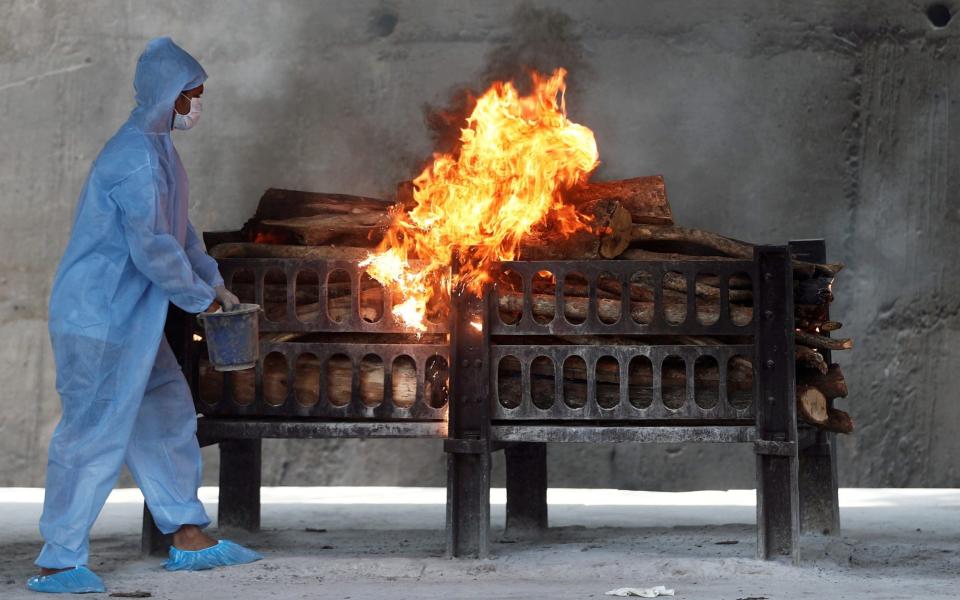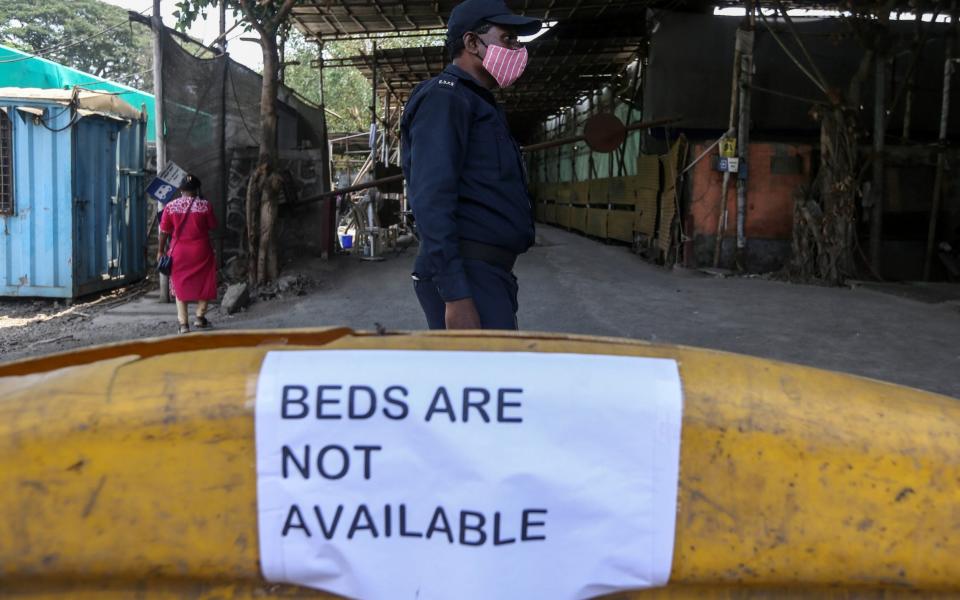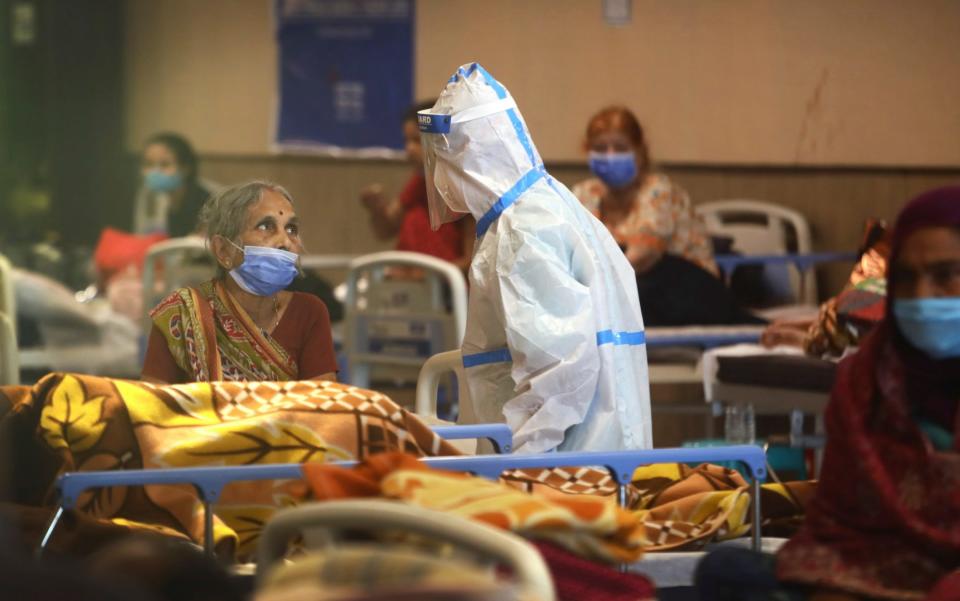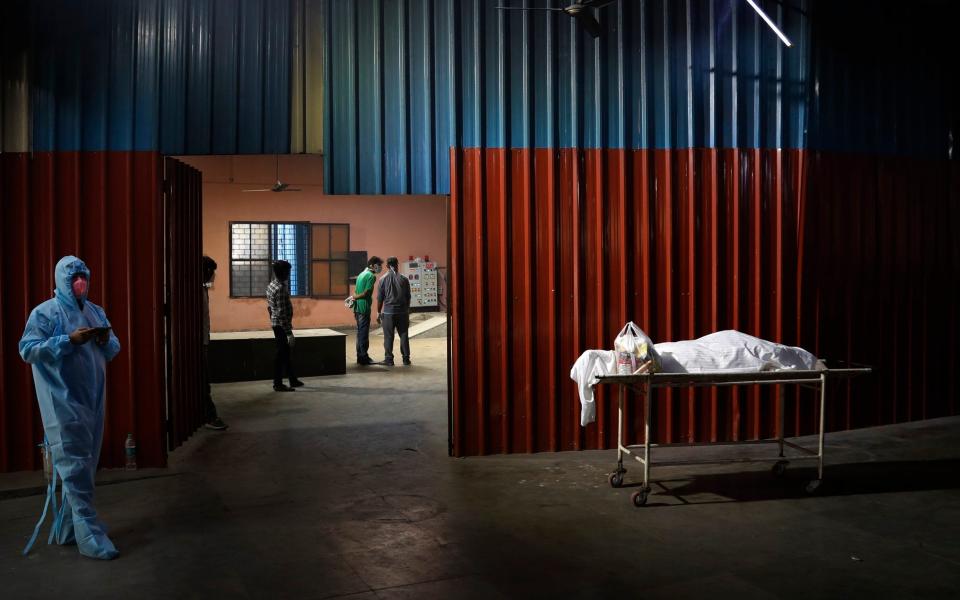Pyres built on pavements as Covid overwhelms India’s hospitals and crematoriums

The anguished voice at the end of the line quickly apologised for waking me at 1.30am, but was desperate and insistent.
The caller explained that his 54-year-old aunt’s blood oxygen levels had plummeted and asked if I might know a doctor in New Delhi who could help. He explained he had been ringing hospitals for hours and no one was picking up.
In recent days I have received a seemingly endless succession of such calls, as health systems around India have buckled under a tsunami of Covid-19 cases.
The daily tally of cases has accelerated terrifyingly in recent weeks, hitting a record 273,810 infections on Monday, up ten-fold in little over a month.
The country’s overstretched hospitals have quickly been overwhelmed under such an onslaught. Beds are nowhere to be found in the biggest cities of Delhi and Mumbai and trying to find treatment for a coughing, gasping relative has become a panicked quest for thousands of families.

Relatives contact anyone who might be able to pull a string, who might have some local clout or who might just know more than them. This includes calling local doctors, officials, those with political ties or, in my case, a journalist who had once interviewed them.
But even the best-connected are struggling to find a bed, and outside the emergency room at Mumbai’s Lilavati Hospital, Gotam Rajani told the Telegraph he was one of the lucky ones after spending a frantic 72 hours hunting a bed for his 75-year-old aunt.
“Neither my aunt or uncle have been able to get a bed and I am so relieved to at least get one bed now,” he said, as a succession of patients were wheeled into the hospital’s emergency room, surrounded by distraught family members.
The hospital had laid out beds in the lobby and converted a whole floor to a Covid ward, but still has to turn patients away, said Dr Kriti Aggarwal, an exhausted 26-year-old resident medical officer inside.
“The manpower here is much less because we are flooded with patients in both the wards and the triage areas and we don’t have enough doctors.
“The capacity is full, if you haven’t called in advance we cannot take you. We tell the relatives to find some other hospital.”

A new, more transmissible “double mutant” variant is feared to be behind the giddying surge in cases. India has little data on the new strain, but early analysis suggests its mutations make it both more transmissible and able to re-infect patients.
The leap in infections has added pressure on Boris Johnson to put India on the UK’s red list of countries requiring passengers to undergo hotel quarantine on arrival. The increase also caused Mr Johnson to cancel a scheduled visit to India next week to discuss a post-Brexit trade deal.
Delhi ordered a six-day lockdown on Monday as overall infections passed the 15 million mark, second only to the United States.
Nearly 180,000 deaths have been confirmed, but a lack of testing and a practice by many Indian states of only recording Covid-19 fatalities when there are no comorbidities means the true tally of both infections and deaths is thought to be many times higher.
“Delhi’s health system is unable to take more patients in big numbers,” Chief Minister Arvind Kejriwal said. “If a lockdown isn’t implemented now the situation will go beyond control.”
Dr Deepak Baid, head of a major private hospital in Mumbai, said the situation was far worse than during the first wave last year and his hospital had run out of medicines, in addition to beds, which in turn has sparked a lucrative nationwide black market for drugs including remdesivir and tocilizumab.

“The second phase that has come in is more of a mutant, which is very infectious, so nearly four times more patients are coming in,” said Dr Baid.
“Definitely there’s a difficulty in getting beds, especially the intensive care and ventilator beds. Even if you get a bed, medicines have become difficult to get because the number of medicines which have been used [and] the demand is much more than the supply.”
Oxygen is also a particular problem. Officials have barred the supply of oxygen to many industries to meet rising demand from hospitals, after patients in the western state of Maharashtra reported travelling for hundreds of kilometres to find a free bed with an oxygen supply. Demand is expected to rise further, the Ministry of Health said.
“Hospitalisation numbers are so high that the healthcare system is not coping well,” said Dr Nitin Shinde, head of a major private hospital in Nagpur.
“We have a shortage of a lot of medicines and drugs. The biggest problem is a shortage of medical oxygen.”
The surge in hospitalisations is feeding into a rise in deaths and cremations. In Ghaziabad, near Delhi, one overwhelmed crematorium has been forced to build new brick platforms for pyres on pavements.
Criticism has mounted over how Narendra Modi’s government has handled the crisis, with millions of Hindu devotees attending the Kumbh Mela festival in the northern Indian town of Haridwar, while election rallies have continued unabated in the states of West Bengal and Assam.
Dr Jyoti Joshi, South Asia Head of the Centre for Disease Dynamics, Economics and Policy, said people had widely disregarded precautions.
“People have got complacent and are not wearing masks and are meeting in large numbers. We have had a festive season, a wedding season and definitely, people have been casual. That is a big contributing factor,” she said.
Modelling meanwhile suggests the situation will not get better quickly. One widely followed projection, by Washington’s University’s Institute for Health Metrics and Evaluation (IHME) predicts India will not peak for another three to four weeks. By then there could be more than 5,000 deaths each day.
That will leave many more enduring the frantic search for a bed.
“The government has given up, that is what it feels like here,” said Mr Rajani, “They just haven’t managed the crisis the second time around.”
With additional reporting by Ben Farmer
Protect yourself and your family by learning more about Global Health Security
Do you or your relatives currently live in India? We want to hear from you about your experience of the pandemic. Email yourstory@telegraph.co.uk to share your experience.

 Yahoo News
Yahoo News 